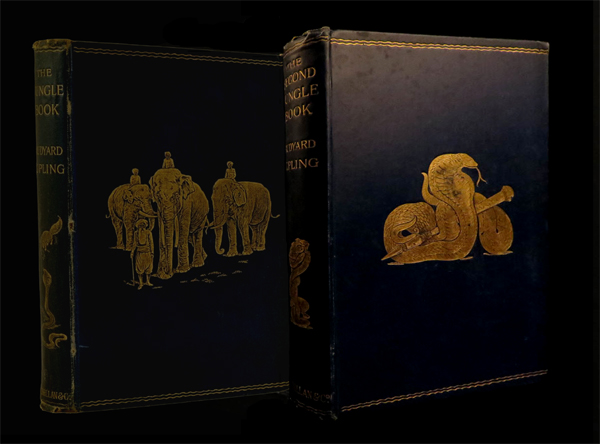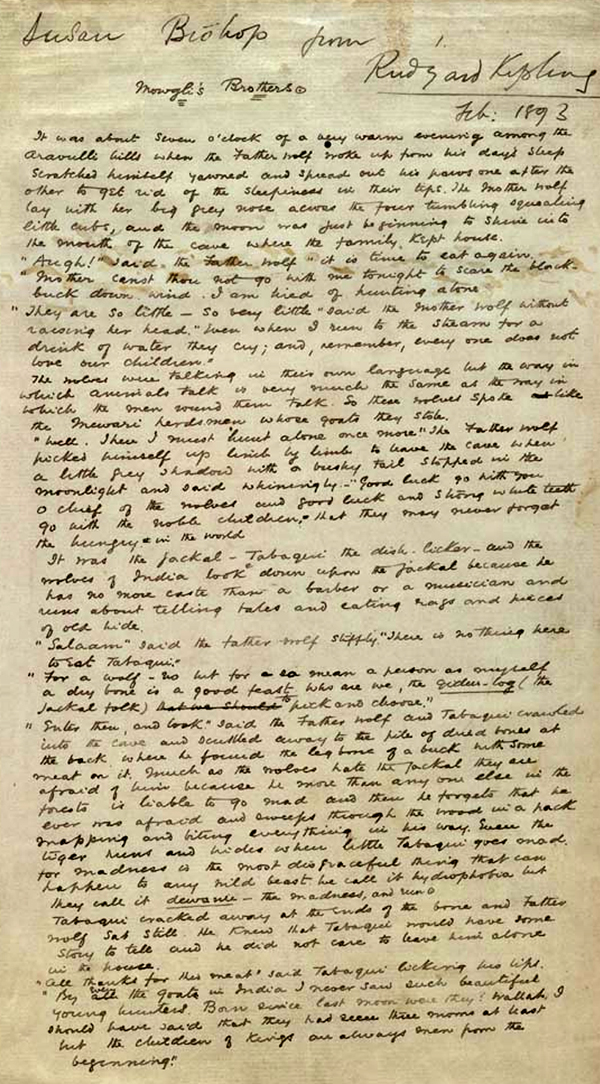| |
|
- T h e J u n g l e B o o k
1 8 9 4
- ________________________________
- [Mowgli]
Mowgli's Brothers
Hunting-Song of the Seeonee Pack
Kaa's Hunting
Road-Song of the Bandar-Log
«Tiger! Tiger!»
Mowgli's Song
The White Seal
Lukannon
«Rikki-Tikki-Tavi»
Darzee's Chant
Toomai of the Elephants
Shiv and the Grasshopper
Her Majesty's Servants
Parade Song of the Camp Animals
Source:
The Project Gutenberg Etext of The Jungle Book by Kipling.


Covers volume I and II: Macmillan, London 1894/1895


Autograph 1893
(from John Bull & Uncle Sam)
Transcript:
Mowgli's Brothers
It was about seven o' clock of a very warm evening among the Aravulli hills when the Father Wolf woke up from his day's sleep, stretched himself, yawned and spread out his paws one after the other to get rid of the sleepiness in their tips. The Mother Wolf lay with her big grey nose across the four tumbling, squealing little cubs, and the moon was just beginning to shine into the mouth of the cave where the family kept house.
"Augh!" said the Father Wolf, "It is time to eat again. Mother, canst thou not go with me tonight to scare the black buck downwind? I am tired of hunting alone."
"They are so little – so very little," said the Mother Wolf without raising her head. "Even when I run to the stream for a drink of water they cry; and, remember, everyone does not love our children."
The wolves were talking in their own language, but the way in which animals talk is very much the same as the way in which the men around them talk. So these wolves spoke like the Mewari herdsmen whose goats they stole.
"Well. Then I must hunt alone once more." The Father Wolf picked himself up limb by limb to leave the cave when a little grey shadow with a bushy tail stopped in the moonlight and said whiningly, "Good luck go with you, O Chief of the Wolves and good luck and strong white teeth go with the noble children, that they may never forget the hungry in the world."
It was Tabaqui, the dish-licker, and the wolves of India look down upon the jackal because he has no more caste than a barber or a musician and runs about telling tales and eating rags and pieces of old hide.
"Saalam," said the Father Wolf, stiffly. "There is no thing here to eat, Tabaqui."
"For a wolf, no. But for so mean a person as myself a dry bone is a good feast. Who are we, the Guidur-log (the Jackal folk) to pick and choose?"
"Enter then and look," said the Father Wolf and Tabaqui crawled into the cave and scuttled away to the pile of dried bones at the back where he found the leg bone of a buck with some meat on it.
Much as the wolves hate the jackal they are afraid of him, because he more than anyone else in the forests is liable to go mad and then he forgets that he ever was afraid and sweeps through the wood in attack, snapping and biting everything in his way. Even the tiger runs and hides when little Tabaqui goes mad, for madness is the most disgraceful thing that can happen to any wild beast. We call it hydrophobia, but they call it dewanee – the madness – and run.
Tabaqui cracked away at the ends of the bone and Father Wolf sat still. He knew that Tabaqui would have some story to tell and he did not care to leave him alone in the house.
"All thanks for the meat" said Tabaqui licking his lips. "By all the goats in India I never saw such beautiful young hunters. Born last moon were they? Well, I should have said that they had seen three moms at least but the children of kings are always men from the beginning."
|
|